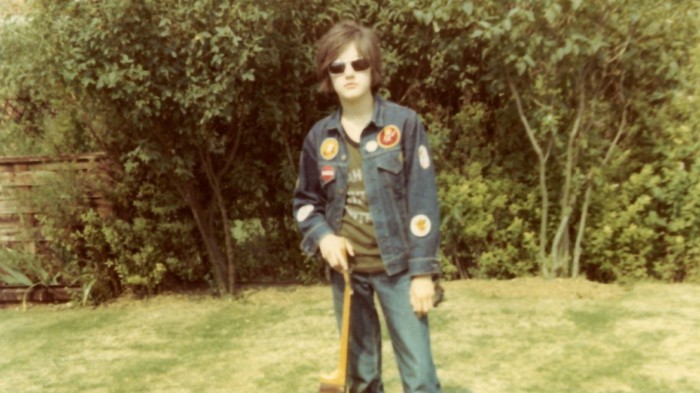Unlock the Editor’s Digest for free
Roula Khalaf, Editor of the FT, selects her favourite stories in this weekly newsletter.
Geoff Dyer has written all kinds of good books — on film, literature, sport, photography, war — but none of them I would call great, until now. Homework is an only-child memoir as funny, forthright and self-revealing as Edmund Gosse’s classic Father and Son (1907), with the bonus of being a picture of postwar England unlike any other. It may prove unforgettable.
Dyer (born 1958) limits the story to his first 18 years, the age he left his native Cheltenham for Oxford, but within those confines a whole world is minutely brought to life. Its unlikely twin stars are his mother and father, modest, private and self-effacing, she a dinner lady and later a hospital cleaner, he a planning engineer. Neither of them suspected the intellectual princeling they were raising in their two-up, two-down house at 1, Fairfield Walk.
Who could have done? Young Geoff seems an unexceptional boy, skinny and sickly, a manic collector of bubblegum cards, Brooke Bond tea cards, comics, Airfix models, “massed ranks” of miniature soldiers. Such devoted accumulation is a commonplace of youth. What distinguishes him is an extraordinary alertness to the apprehended world, and an inchoate longing for something absent, something possibly called “beauty”. The memory of childhood to most of us is a burial chamber long sealed off, but Dyer, like a pith-helmeted explorer, has broken into the tomb and, Eveready torch on full beam, precisely catalogues the mundane treasure of those early years and brings it back for our inspection.
And not just the sights but the taste and the smells he recaptures, too. The crumbling Victorian public baths with “the clangy, heavily chlorinated acoustic” where he learnt to swim as a schoolboy was also the place he collected the “foot badge” of his first verruca. How deeply that Victorian era still leaked into life chez Dyer, with their outside toilet, coal fires and blade-sharpeners knocking at the door. Even more so in his relatives’ houses with their “trapped or stale time” heightened by the “exhausted wallpaper” and smell of dog food.
School food was a lasting horror for him, but it was horrible at home, too: “The opposite of Oliver Twist, I was always wanting less or, ideally, none at all.” What did he eat? Boiled sweets, fruit gums, chocolate, Frosties, anything and everything with sugar, heaped spoons of it, even “sugar sandwiches”. Tea without sugar wasn’t just anathema to his parents — “it was practically an abuse of their human rights”.
Perhaps the sugar helped to balance the sourness elsewhere, like his grandad’s house where all was ancient and damp and smelly. Here stood an implacable upright piano, its keys “nicotine yellow” and never played. “It was an amazing thing, that piano: a conceptual marvel in that it was not just unplayable; there was no music in it.” That description exemplifies Dyer’s talent. Anyone could have written the first part of the sentence; but he stays with the thought a fraction of a second longer, which allows him to hop to that startling and hilarious conclusion.
The formative event of his young life, the one for which he still feels “absolute gratitude”, was his passing the 11-plus exam to get to grammar school — a gateway to educational prospects that would otherwise be out of reach for many working-class children. He understands the unfairness of this system, and that it was the making of him. He also understands how it foreshadowed a deepening separation from his parents, who didn’t read or care for culture as he did. His mother would like to have been a seamstress but was thwarted even in this humble ambition, as her son explains movingly. His father also had a passionate drive, which was to save money or, more accurately, not to spend it. Indifferent to “books, beer, films, cars, music”, he was consistently outraged by the price of things — even to replace a toilet brush irked him. One excruciating episode involves Dyer Sr buying a tennis racket for his son, who stands by mortified as dad asks the sales assistant for a discount to which he’s not entitled. He got it, too, and left the shop “head held high”.
What’s interesting is the way Dyer revels in the memory of paternal parsimony (he mentions three times the story of a pricey choc-ice his dad once bought outside Madame Tussauds museum) and inherits the condition himself — yet never considers it to be an Achilles heel. He admits that he’s a “bodger” who would rather put up a shelf than have “to pay other people to do anything”, and is obsessed with getting stuff “for free”.
Why do I find this strange? First, because stinginess is so at odds with the suave, knowing figure Dyer cuts in his writing. And second, because one might have thought him unwilling to be diminished by his father’s most obvious personal flaw, which perhaps isn’t as noble-sounding as an Achilles heel and more like spiritual bad breath.
But then honesty is an animating principle in Homework, and Dyer rightly remarks that he makes no one in it look as bad as he does himself. This Gloucestershire lad turned boomer Proust is his own man, and he has written a highly original memoir that will provoke, amuse, beguile — and endure.
Homework: A Memoir by Geoff Dyer Canongate £20, 288 pages
Join our online book group on Facebook at FT Books Café and follow FT Weekend on Instagram and X




